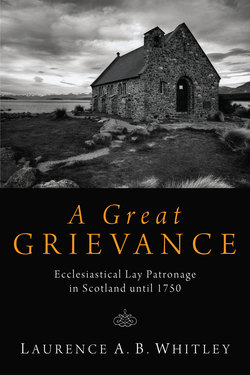Читать книгу A Great Grievance - Laurence A.B. Whitley - Страница 5
На сайте Литреса книга снята с продажи.
Foreword
ОглавлениеThis book, peppered with perspicacity, represents a very welcome contribution by an engaged writer to the understanding of what was manifestly a chronic and debilitating problem in Scottish history and its church history of longue durée, namely, lay patronage of the Kirk. Underlying this was the basic issue of the Church’s funding from medieval times onwards, and thus of the resources to pay its clergy and ministers. While something of a universal problem, this was a particularly contentious issue over those centuries in Scotland when church and state, Christianity and society, faith and nation formed a notional unity or were mutually interdependent as the indigenous expression of “Christendom.” The wealthy, notably the aristocracy and landed gentry, and so the ruling classes, usually acted as benefactors and patrons of the Kirk, even if swathes of them were also often its chief plunderers and despoilers. The committed who contributed and who, after the Reformation especially, were well aware that the Church did not just belong to the clergy, naturally expected a considerable “say” in church affairs and ministerial appointments in particular. Yet in a context where there were theological sensitivities about the freedom, autonomy, independence and authority of the Church, be it in the name of hierarchy, presbytery, or Christ, the recipe for tensions and conflicts was endemic and potent. The acuteness of this politicized problem for the infrastructure of Scottish Church, Catholic or Reformed, is well known. It seems to deface much of its history, bearing in mind that economic exigencies in one of Western Europe’s poorer nations often exacerbated things.
Laurence Whitley’s particular focus in this book is on the religious, political, and church settlements from 1688 to 1712 and their aftermath in the presbyterian Church of Scotland throughout the first half of the eighteenth century. Despite this era’s crucial importance for the issue, it has surpisingly not been so intensively studied as many previous and subsequent periods. This enhances the value of this study, which will act as a bridge in treatments of the topic and serve as a reference work for many details of patronage and patrons in that era and before. As one of the diminishing number of contemporary scholar-ministers in the modern Scottish Kirk, and as someone of recognized theological, historical, and literary skills, Dr. Whitley is to be lauded for bringing this research, which embodies some years of arduous academic research, to fruition and to light. The endurance that enabled its completion will have the reward of providing a durable tool and asset for future researchers and others.
W. Ian P. Hazlett
Emeritus Professor of Ecclesiastical History
University of Glasgow
